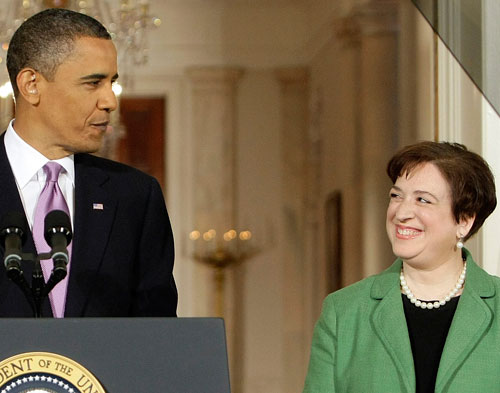Kagan dances around questions about First Amendment application

President Barack Obama introduces Solicitor General Elena Kagan as his choice for Supreme Court Justice in the East Room of the White House in Washington, May 10.. (AP Photo/J. Scott Applewhite)
While everyone is dithering over Supreme Court nominee Elena Kagan's banning of military recruiters from Harvard Law while she was a dean there because of don't-ask-don't-tell, I'm a little more concerned about here record on the First Amendment.
Back in September when Solicitor General Kagan was arguing in front of the Supreme Court in the case of Citizens United v. FEC (This was the case in which McCain-Feingold had blocked the showing of "Hillary: the Movie.) I noted she implied that pamphlets could be banned, though books might not be.
When the case was first argued in March, the government lawyers insisted books would be covered under the law, which Justice Samuel Alito said was "pretty incredible." But in September Kagan backtracked.
The exchanges between the justices and the attorneys arguing the case were nothing short of bizarre.
Take this exchange as an example:
JUSTICE GINSBURG: May I ask you one question that was highlighted in the prior argument, and that was if Congress could say no TV and radio ads, could it also say no newspaper ads, no campaign biographies? Last time the answer was, yes, Congress could, but it didn't. Is that -- is that still the government's answer?
GENERAL KAGAN: The government's answer has changed, Justice Ginsburg.
(Laughter.)
GENERAL KAGAN: It is still true that BCRA 203, which is the only statute involved in this case, does not apply to books or anything other than broadcast; 441b does, on its face, apply to other media. And we took what the Court -- what the Court's -- the Court's own reaction to some of those other hypotheticals very seriously. We went back, we considered the matter carefully, and the government's view is that although 441b does cover full-length books, that there would be quite good as-applied challenge to any attempt to apply 441b in that context.
And I should say that the FEC has never applied 441b in that context. So for 60 years a book has never been at issue.
JUSTICE SCALIA: What happened to the overbreadth doctrine? I mean, I thought our doctrine in the Fourth Amendment is if you write it too broadly, we are not going to pare it back to the point where it's constitutional. If it's overbroad, it's invalid. What has happened to that.
GENERAL KAGAN: I don't think that it would be substantially overbroad, Justice Scalia, if I tell you that the FEC has never applied this statute to a book. To say that it doesn't apply to books is to take off, you know, essentially nothing.
CHIEF JUSTICE ROBERTS: But we don't put our -- we don't put our First Amendment rights in the hands of FEC bureaucrats; and if you say that you are not going to apply it to a book, what about a pamphlet?
GENERAL KAGAN: I think a -- a pamphlet would be different. A pamphlet is pretty classic electioneering, so there is no attempt to say that 441 b only applies to video and not to print. It does -
JUSTICE ALITO: Well, what if the particular -- what if the particular movie involved here had not been distributed by Video on Demand? Suppose that people could view it for free on Netflix over the internet? Suppose that free DVDs were passed out. Suppose people could attend the movie for free in a movie theater; suppose the exact text of this was distributed in a printed form. In light of your retraction, I have no idea where the government would draw the line with respect to the medium that could be prohibited.
GENERAL KAGAN: Well, none of those things, again, are covered.
JUSTICE ALITO: No, but could they? Which of them could and which could not? I understand you to say books could not.
GENERAL KAGAN: Yes, I think what you -what we're saying is that there has never been an enforcement action for books. Nobody has ever suggested -- nobody in Congress, nobody in the administrative apparatus has ever suggested that books pose any kind of corruption problem, so I think that there would be a good as-applied challenge with respect to that.
JUSTICE SCALIA: So you're -- you are a lawyer advising somebody who is about to come out with a book and you say don't worry, the FEC has never tried to send somebody to prison for this. This statute covers it, but don't worry, the FEC has never done it. Is that going to comfort your client? I don't think so.
Should a person this willing to jettison the First Amendment be on the Supreme Court? Remember this was the ruling President Obama said in his State of the Union address should be reversed by legislation. Packing the court is another attack.

















